According to the American Society for Prevention of Cruelty to Animals, approximately 3.3 million dogs enter U.S. animal shelters every year. Of those, 1.6 million are adopted each year but 670,000 are still euthanized every year. Even though this number has dropped in the last few years, it is still significant.
Yet, dogs have potentials that humans don’t have and could possibly save humans’ lives, thanks to their incredible sense of smell (they have 300 million olfactory receptors vs. our 5 million and can detect smells 100 million times less concentrated than humans can). So, what if, instead of killing those shelter dogs, we could save them, love them and train them for cancer detection?
Here is the story of two dogs, one being a German Shepherd, returned twice to a shelter by his owner and probably destined to be euthanized. The second one being a yellow Lab adopted from a breeder. Two very different dogs with very different backgrounds and upbringings united as best friends, training together to detect cancer in humans with the ultimate goal of helping humans discover which specific aromatic volatile compounds are present in cancer patients. One of these remarkable dogs gave a man’s life new meaning, a hospital a new image and mankind new hope. I will describe how my husband and I met those two dogs and interviewed their current owners.
The Story of Linus
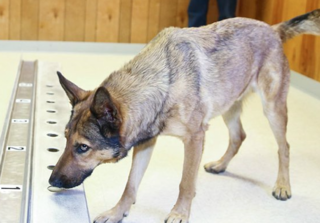
In my previous Psychology Today post, I describe the interview my husband and I conducted with Dina Zaphiris of the In Situ Foundation, who is training dogs in Chico, California, to detect cancer from exhaled breath, saliva, plasma and urine samples, and who is participating in published and soon-to-be-published double-blind medical studies.
What I didn’t mention in that post is that in 2012, Dina wanted to adopt and train a new German Shepherd for an upcoming medical study. Her requirement: The dog needed to be motivated to work. Where could she find this new dog? She decided she might be able to save a dog from a German Shepherd shelter, and thus visited the nearby German Spheres shelter in search of a suitable canine. In that shelter, she interacted with many dogs but 3-year-old Sam stood out. Sam was extremely insecure, had been returned twice by previous owners —with no precise reason —and had separation anxieties. He would not separate from a little linen cloth, a sort of security blanket which he would carry in his mouth all the time. This is why Dina renamed him Linus, after the blanket-carrying boy in the Peanuts cartoon that fitted the dog well. The other characteristic of Linus is that he was obsessed by balls: The only thing that mattered in his life was to run after a ball. Because Linus’ motivation for balls was so high, Dina decided to adopt him and train him for cancer detection, which he performed perfectly, because his reward was running after a ball. For example, Dina would put 5 separate urine samples on a rack, one of them being a cancer urine sample, the other 4 being healthy urine samples. Each time Linus would sit in front of the right cancer urine sample after sniffing all five samples, he would get the greatest pleasure of running after his favorite ball. Very quickly, Linus got good at detecting cancer urine samples, saliva samples and also exhaled breath samples because he was, and is still, extremely motivated by getting his reward.
In addition to being good at sniffing cancer, Linus is extremely sensitive to humans’ emotions: When a woman came to an In Situ training without being able to bring her support dog to the training and became very anxious, Linus went to her right away and stayed with her the whole time to calm her down.
Linus went from the brink of death in a shelter to being a very sensitive, highly skilled, cancer sniffing dog participating in several published or soon-to-be-published medical studies.
But now, let’s talk about another dog Dina is training: Enloe. My husband and I met Enloe, and were impressed by his strength and high energy. While playing with Enloe, we interviewed Enloe’s new owner Jeff Hunt.
The Story of Enloe
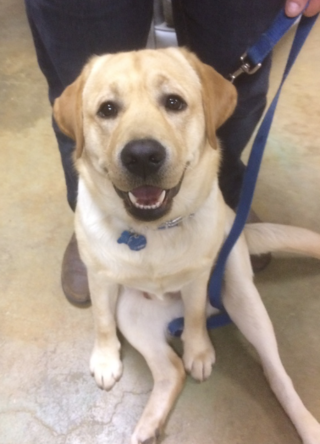
As the hospital committee searched for an owner for Enloe, they heard about one of the applicants, Jeff Hunt who was the husband of Traci Hunt, Enloe Regional Cancer Center’s director. Jeff fitted the criteria of being home most of the time since he was fighting against a cancer called multiple myeloma. Here is Jeff’s story.
Jeff and Enloe: A Love Story
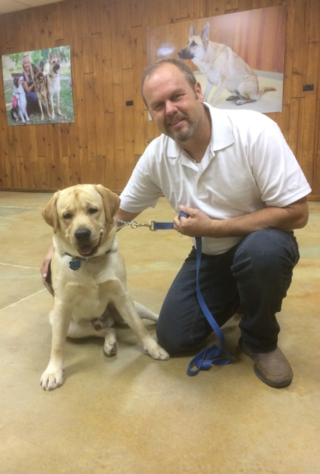
In March 2017, 10-week-old Enloe was brought to Jeff, his little happy body fitting in Jeff’s hands. It was love at first sight between Enloe, Jeff and Jeff’s family. Between March 2017 and now, Enloe grew from 12 to 78 pounds and completely changed Jeff’s life. Jeff went from being depressed and having low energy to being full of hope and joy. Now Enloe gets Jeff to smile and laugh often because Enloe is so much fun to watch and interact with. Jeff says “Enloe snores like you can’t believe, sleeps on his back with his legs straight up, carries a stuffed plush monkey everywhere with him without damaging it (when he tears down other toys) and that defiant look he gives you when you ask him to do something he doesn’t want to do is so much fun to watch.” Enloe gets Jeff going in the morning, getting him to forget he has to be on chemotherapy for his cancer for the rest of his life and getting him to forget about the neuropathy in his feet caused by the toxic chemotherapy. Enloe goes with Jeff everywhere and is known by everybody in and around Chico. His coat says: “in training” and “PET ME” so everybody pets him. He is asked to participate in many events, like the 5 K run for wellness in Chico where he was asked to be at the finish line.
Enloe’s Influence on a Hospital
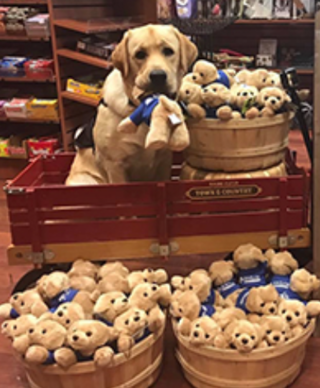
Enloe the dog is now changing the image of the independent non-profit Enloe Regional Cancer Center and Enloe Medical Center for the better. Dr. Enloe, founder of the hospital would be proud. In addition to coming to Enloe Medical Center because of its reputation for personalized, nurturing, humanizing and respectful care of patients, with emphasis on body, mind and spirit healing, patients and their families are also curious about Enloe the dog. When driving towards the hospital, we see billboards in and around Chico with Enloe the dog’s picture. The hospital ordered 100 little stuffed Enloes for its gift shop and all the toys sold out so quickly that more needed to be ordered. When Enloe the dog came for a photo shoot to the gift shop to be photographed with the little stuffed Enloes, many people came to interrupt the photo shoot because they all wanted a picture with Enloe. Because of that, the photo shoot took almost 2 hours instead of the planned 10 minutes. Enloe has also been photographed in a helicopter for Enloe medical center’s FlightCare, and with the fire truck of the Durham Volunteer Fire and Butte County EMS. Enloe is becoming famous and is changing the image of Enloe Medical Center.
In the last year, Enloe Medical Center received phone calls asking for Enloe the dog to sniff them for cancer detection, but unfortunately, dogs are not yet allowed by the FDA to diagnose cancer in patients. Several double-blind studies done in the USA, France, Italy, Japan and Sweden have been published already in reputable medical journals, but many more studies need to be published before dogs can be allowed to detect cancer in new patients.
What’s in Enloe’s future?
Enloe the dog has been in training for cancer detection with Dina since last year. He has now finished his “hunt and find” training with cancer samples only and is now starting to be able to differentiate healthy exhaled breath samples from exhaled breath samples that belong to cancer patients. Enloe’s training needs to continue at least one more year. Dina’s plan is for Enloe to be the “demo” dog to help train students that are coming from all over the world at the foundation to learn about cancer detection dogs. As for Jeff, his hope is that in the future, Enloe will be able to work at Enloe Regional Cancer Center in Chico, detecting cancers early. Jeff says, “It means so much to me to be able to detect cancers early and in the future change people’s lives for the better so that people don’t have to go through what I have been through. If my cancer had been detected early, it would have been a different story.”
Hopefully in the future, Enloe and other dogs will be able to save thousands of human’s lives thanks to an early cancer detection.
Lessons to Be Learned from Jeff
Since dogs are still in training and are not yet allowed by the FDA to diagnose cancer, here is one lesson we can learn today from Jeff’s story: Even if you are given a clean bill of health by your primary care physician, if you experience any symptom that doesn’t improve after a few days, get yourself checked by a health care professional and don’t hesitate to get a second opinion if your symptoms are getting worse over the next few weeks. It is always better to be safe than sorry especially since the prognosis of cancers is much better when cancers are caught early.
Equally important, the story of Jeff and Enloe’s relationship illustrates that owning a dog “on a mission,” like, Enloe, can give an owner’s life new meaning, lifting people out of depression and improving their emotional health, which can’t help but also sustain physical health.
Lessons to Be Learned from Linus and Enloe
Dogs are very sensitive animals and have incredible abilities, among them a sensational sense of smell and a strong love and caring for humans. Dogs can detect humans’ moods and comfort them if humans are sad or anxious, some dogs can detect cancer, or when an epileptic seizure is about to happen. So, if instead of killing dogs in shelters, we gave them love and trained them to detect cancer, what a difference for mankind this could make.
Originally Published In Psychology Today
© Dr. Chris Gilbert
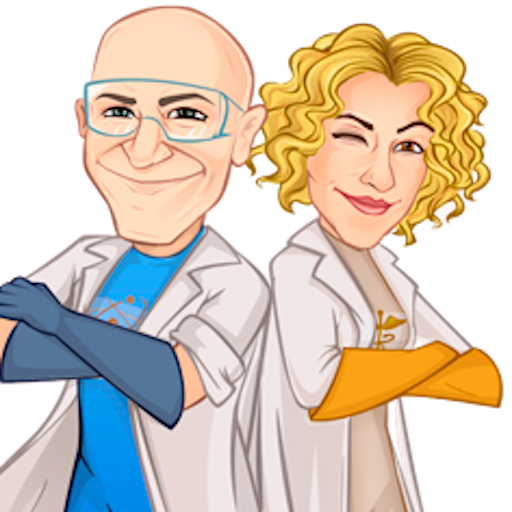
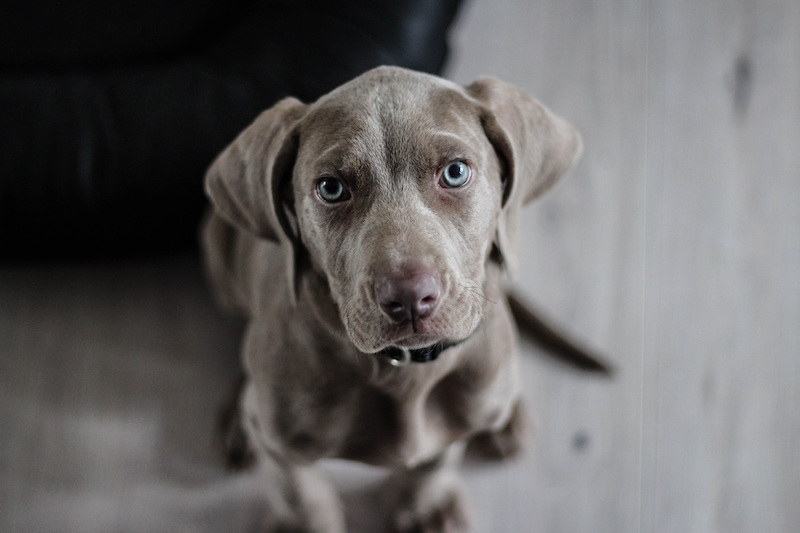
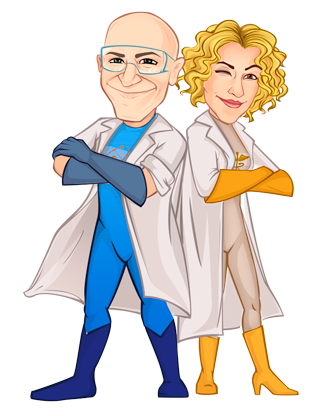
You’re so cool! I don’t believe I have read a single thing like that before.
So wonderful to discover another person with genuine thoughts on this subject
matter. Really.. many thanks for starting this up.
This site is something that is required on the internet, someone with some originality!
Excellent way of telling, and fastidious article to take information regarding my presentation topic, which i am going
to deliver in university.
Wow, this post is good, my younger sister is analyzing these kinds
of things, thus I am going to convey her.